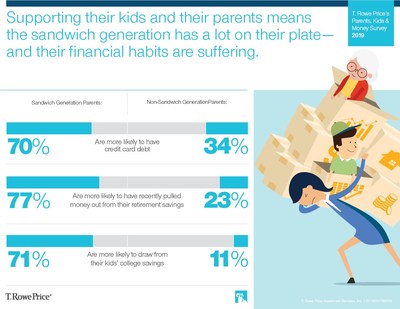T. Rowe Price: Sandwich Generation Strain Negatively Impacts Kids And Their Money Habits
"The data are clear that balancing care for two generations simultaneously can be difficult," says
"Parents who are dual caregivers are less likely to teach their kids about money and support them in other ways. But having money conversations can be a powerful way to bridge their understanding and impart valuable financial lessons. Talk to them about your financial life and the tradeoffs you're making when they're young and as they grow into adulthood. This transparency can position them to better handle financial challenges when they become adults," says Mr. Ritter.
To help parents discuss money with their school-age kids,
SANDWICH GENERATION IS FINANCIALLY STRAINED
- More than a third of parents with 8 to 14 year old kids are caring for an aging family member: 35% of parents with 8 to 14 year old kids are dual caregivers, caring for both their kids and an aging parent or relative. 68% of them report that their aging parent or relative is living with them.
- Caring for aging parents can be expensive: Nearly one-third (31%) of dual caregivers spend
$3,000 or more a month caring for an aging parent or relative. 34% spend$1,000 - $2,999 each month, and 35% spend less than$1,000 . 74% of all parents caring for an aging parent or relative say they are not receiving any kind of financial aid or support from social services to help care for their family member. - The expense of caring for aging family members causes financial strain: 74% of dual caregivers agree with the statement, "Caring for my parent/relative causes financial strain."
- Parents who are dual caregivers are more likely to carry a credit card balance and have balances more than
$5,000 : 63% of parents who are caring for an aging family member regularly carry a credit card balance, compared with 37% of parents who are not caring for an aging family member. Additionally, among dual caregiver parents with credit card debt, 70% of them have$5,000 or more in credit card debt, compared with only 34% of parents with credit card debt who are not caring for aging family members. - Dual caregivers are significantly more likely to have pulled from retirement and college savings: Parents who are caring for an aging family member are more than three times as likely to have pulled money from their retirement savings (77% vs. 23%) and more than six times as likely to have withdrawn money from their kids' college savings (71% vs. 11%).

FINANCIAL STRAIN OF THE SANDWICH GENERATION IMPACTS KIDS
- Kids of dual caregivers feel their parents don't make enough time for them: 73% of parents caring for an aging family member say that it takes away from time with their kids—and the kids agree. Kids of dual caregivers are nearly three times as likely (59% vs. 20%) to agree with the statement, "My parents do not make enough time for me."
- Kids of dual caregivers say their parents worry about money: Kids of dual caregivers are more likely to say that their parents worry about money (72% vs. 45%), compared with kids whose parents aren't caring for an aging parent.
- Parents who are dual caregivers are more likely to be reluctant to discuss money with their kids: While half of all parents (50%) have some reluctance to discuss money with their kids, parents who are caring for an aging family member in addition to their kids are particularly reluctant. Dual caregivers are more likely to have some reluctance to discuss money with their kids (73% vs. 37%), compared with parents who are not caring for an aging family member.
- Kids of dual caregivers wish their parents taught them more about money: Kids of parents who are caring for an aging family member are more likely (75% vs. 41%) to agree with the statement, "I wish my parents taught me more about money."
- Parents who are dual caregivers miss more opportunities to teach their kids about money: Dual caregivers are more likely to agree with the statement (70% vs. 35%) "I miss opportunities to talk to my kids about money."
- Kids of dual caregivers are more likely to spend their money right away: Kids of parents who are caring for an aging family member are more likely to agree with the statement (70% vs. 49%), "I like to spend money as soon as I get it."
- Kids of dual caregivers are given money without guidance: Dual caregivers are more likely (62% vs. 15%) to say that they have no idea what their kids spend their allowance on and have kids who spend their allowance right away (77% vs. 41%). Dual caregivers are also more likely to give an allowance without requirement to earn it (32% vs. 8%).
MONEY CONFIDENT KIDS is a registered trademark of
ABOUT THE SURVEY
The eleventh annual T. Rowe Price Parents,
ABOUT
Founded in 1937,
![]() View original content to download multimedia:http://www.prnewswire.com/news-releases/t-rowe-price-sandwich-generation-strain-negatively-impacts-kids-and-their-money-habits-300818590.html
View original content to download multimedia:http://www.prnewswire.com/news-releases/t-rowe-price-sandwich-generation-strain-negatively-impacts-kids-and-their-money-habits-300818590.html
SOURCE
Heather McDonold, T. Rowe Price, 410-345-6617, heather_mcdonold@troweprice.com; or Monique Bosco, T. Rowe Price, 410-345-5740, monique_bosco@troweprice.com

